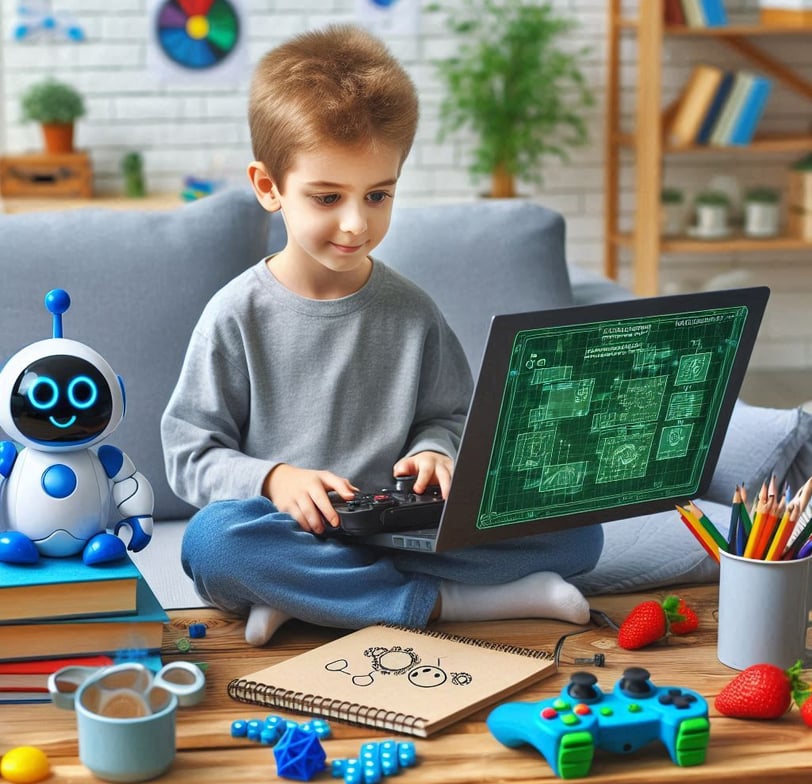Knowledge is the fuel that powers the train of progress.
AI and Coding Games - Making Learning Fun at Home
As we continue our "100 Days of AI for Kids" journey, today we're diving into an exciting topic that combines education, technology, and play: AI and coding games that make learning fun at home. In our fast-paced digital world, introducing children to coding and artificial intelligence (AI) concepts early on can give them a significant advantage. But how do we make these complex subjects engaging and accessible? The answer lies in educational games and interactive platforms designed to teach these skills in a fun, immersive way.
Srinivasan Ramanujam
9/21/20243 min read
Day 4: AI and Coding Games - Making Learning Fun at Home
As we continue our "100 Days of AI for Kids" journey, today we're diving into an exciting topic that combines education, technology, and play: AI and coding games that make learning fun at home. In our fast-paced digital world, introducing children to coding and artificial intelligence (AI) concepts early on can give them a significant advantage. But how do we make these complex subjects engaging and accessible? The answer lies in educational games and interactive platforms designed to teach these skills in a fun, immersive way.
Why AI and Coding Games?
Before we explore specific games and platforms, let's understand why they're so valuable:
Engagement: Games naturally captivate children's attention, making learning feel like play.
Immediate Feedback: Most coding games provide instant results, helping kids learn from their mistakes quickly.
Problem-Solving Skills: These games often present puzzles that enhance logical thinking and creativity.
Future-Ready Skills: Exposure to coding and AI concepts prepares children for a tech-driven future.
Boost Confidence: As kids complete challenges, they build confidence in their abilities to tackle complex problems.
Top AI and Coding Games for Kids
Let's explore some of the best platforms and games that can introduce your children to the world of AI and coding:
1. Scratch
Developed by MIT, Scratch is a free, block-based visual programming language perfect for beginners.
Activity Idea: Challenge your child to create a simple game where a character collects items while avoiding obstacles. This teaches basic programming concepts like loops, conditionals, and variables.
2. Code.org
Code.org offers a variety of coding courses and activities for different age groups, often featuring popular characters from movies and games.
Activity Idea: Have your child complete an "Hour of Code" tutorial, such as the Minecraft-themed coding challenges, which introduce concepts like sequencing and debugging.
3. AI for Oceans
This program by Code.org introduces students to AI concepts while focusing on environmental issues.
Activity Idea: Guide your child in creating an AI model to identify and classify marine debris, learning about machine learning and its applications in environmental conservation.
4. Swift Playgrounds
Developed by Apple, Swift Playgrounds teaches coding in Swift through interactive puzzles and challenges.
Activity Idea: Help your child guide a character through a 3D world using coding commands, learning about functions and loops.
5. Machine Learning for Kids
This platform allows children to create projects using machine learning models for image recognition, text classification, and more.
Activity Idea: Build a rock-paper-scissors game that uses a camera to recognize hand gestures, introducing concepts of AI and computer vision.
Making the Most of AI and Coding Games at Home
To ensure your child gets the most out of these educational games, consider the following tips:
Set aside dedicated time: Allocate specific periods for these activities, treating them as important as any other subject.
Learn together: Don't be afraid to dive in with your child. Learning together can be a great bonding experience.
Encourage experimentation: There's often no "right" way to solve a coding problem. Encourage your child to try different approaches.
Connect to real-world applications: Help your child understand how the concepts they're learning apply to technology they use every day.
Celebrate achievements: Acknowledge your child's progress, no matter how small. This positive reinforcement can boost their motivation.
Conclusion
Incorporating AI and coding games into your child's learning routine can be a game-changer. These interactive platforms not only teach valuable technical skills but also foster creativity, critical thinking, and problem-solving abilities. By making learning fun and engaging, we can inspire the next generation of innovators and tech leaders.
Remember, the goal isn't to turn every child into a professional programmer, but to introduce them to the logic and creativity behind technology. These skills will be invaluable in any future career path they choose.
Stay tuned for Day 5 of our "100 Days of AI for Kids" series, where we'll explore another exciting aspect of AI education for children!






